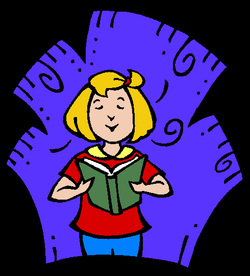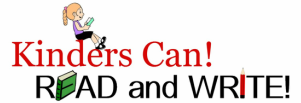
Getting kindergartners reading and writing by the end of the school year is really a very simple task -- if you teach them in a way they can easily understand and follow. Of course, those with significant learning disabilities are bound to struggle and may take a bit longer. But your average kids, and even your below average kids, should be able to learn to read and write in kindergarten with relative ease. And your above average and highly gifted kids should catch on in a snap!
When I say your kids should be able to read and write by the end of kindergarten, I mean that they should be able to pick up any little trade book they want to read and begin figuring out what it says. Think: The Little Engine That Could, Are You My Mother, If You Give A Mouse A Cookie, Curious George, etc. And they should be able to write whatever comes to mind so that others can read it.
Yes, some of your kids are bound to be more fluent when reading whatever trade book they pick up than others, but ALL of your kids (except for those with significant learning issues) should be able to figure out the words on the page and understand the message behind them. And, yes, some of your kids will have better spelling, spacing, and punctuation habits than others, but ALL of them (except for those with significant learning issues) should be able to express themselves through words and sentences -- without having to copy words off of a word wall or ask for help to write what they want to say. In fact, most of my kindergarten students wrote full-page stories each day for the last few months of school. And they did so ALL BY THEMSELVES! You can get your kids to do this on their own as well!
The key is to use your time wisely and to teach everyone what they need to know to read and write new and/or unfamiliar words. Making them learn lists of "sight words" won't do it. Either will having them copy sentences off the board or word wall. Busywork won't either. Nor will coloring sheets. Or cute t.v. programs.
Instead, you'll have to use your precious time to teach them what they really need to know -- letters, sounds, blending and segmenting techniques, phonetic "tricks," and some of the most common "outlaw" words. And you'll need to show them how to use all this knowledge to read and write real text. While doing so, you'll need to work on improving their background knowledge and vocabulary. And, no doubt, you'll have to work on their comprehension skills as well. But when done in a systematic, methodical way, you can do all this AND have fun with your kids at the same time.
You can talk with them. Read to them. Teach new songs and cheers to them.
You can get them writing fun stories, and can enjoy listening to them read them aloud to you afterward.
You can create with them, make food with them, solve problems with them.
You can do science experiments and discover all sorts of new facts about the world we live in with them.
And, if you've really used your time wisely, you can send them on to their first grade teachers fully capable of reading and writing just about anything they can get their hands on or think up! What's more, you can send them on with lots of real world knowledge and problem solving skills as well.
Interested? Read the new, fully updated edition of Kinders Can! READ and WRITE! It will walk you through exactly what you need to do to get your kindergarten students reading and writing this year. Go to www.KindersCanReadandWrite.com to get your digital copy TODAY!
Wishing you all the best and much success,
Katy Huller
www.KindersCanReadandWrite.com
When I say your kids should be able to read and write by the end of kindergarten, I mean that they should be able to pick up any little trade book they want to read and begin figuring out what it says. Think: The Little Engine That Could, Are You My Mother, If You Give A Mouse A Cookie, Curious George, etc. And they should be able to write whatever comes to mind so that others can read it.
Yes, some of your kids are bound to be more fluent when reading whatever trade book they pick up than others, but ALL of your kids (except for those with significant learning issues) should be able to figure out the words on the page and understand the message behind them. And, yes, some of your kids will have better spelling, spacing, and punctuation habits than others, but ALL of them (except for those with significant learning issues) should be able to express themselves through words and sentences -- without having to copy words off of a word wall or ask for help to write what they want to say. In fact, most of my kindergarten students wrote full-page stories each day for the last few months of school. And they did so ALL BY THEMSELVES! You can get your kids to do this on their own as well!
The key is to use your time wisely and to teach everyone what they need to know to read and write new and/or unfamiliar words. Making them learn lists of "sight words" won't do it. Either will having them copy sentences off the board or word wall. Busywork won't either. Nor will coloring sheets. Or cute t.v. programs.
Instead, you'll have to use your precious time to teach them what they really need to know -- letters, sounds, blending and segmenting techniques, phonetic "tricks," and some of the most common "outlaw" words. And you'll need to show them how to use all this knowledge to read and write real text. While doing so, you'll need to work on improving their background knowledge and vocabulary. And, no doubt, you'll have to work on their comprehension skills as well. But when done in a systematic, methodical way, you can do all this AND have fun with your kids at the same time.
You can talk with them. Read to them. Teach new songs and cheers to them.
You can get them writing fun stories, and can enjoy listening to them read them aloud to you afterward.
You can create with them, make food with them, solve problems with them.
You can do science experiments and discover all sorts of new facts about the world we live in with them.
And, if you've really used your time wisely, you can send them on to their first grade teachers fully capable of reading and writing just about anything they can get their hands on or think up! What's more, you can send them on with lots of real world knowledge and problem solving skills as well.
Interested? Read the new, fully updated edition of Kinders Can! READ and WRITE! It will walk you through exactly what you need to do to get your kindergarten students reading and writing this year. Go to www.KindersCanReadandWrite.com to get your digital copy TODAY!
Wishing you all the best and much success,
Katy Huller
www.KindersCanReadandWrite.com

 RSS Feed
RSS Feed
